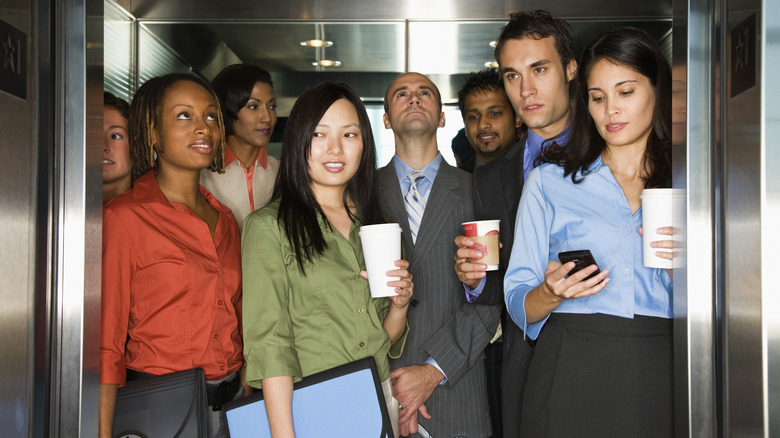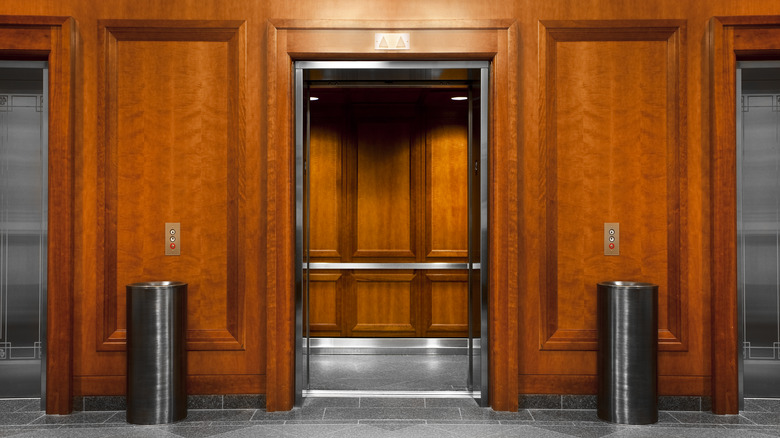Is New York's Bizarre Elevator Law Actually Real?
Elevators: Easily one of the most awkward places to stand. Maybe you do the purse-lipped nod when you get on. Maybe you avoid eye contact altogether and desperately pretend to be busy on your phone. Maybe you don your best stone face and stare as the numbers light up. Well, good news: If you do any of these things in New York State, you're not quite totally breaking the law, but almost. At least, that's what loads of online articles say.
As the tale goes and has been repeated time and again on sites like CBS News, 101.5 WPDH, Country 106.5 WYRK, and more: It is apparently not only frowned upon to talk in an elevator in New York, it's outright illegal. As Beacon Hill Staffing says, this very prescriptive (and completely unenforceable) law dictates the precise physical motions and gestures someone must adopt while standing in an elevator in New York State. Specifically, face forward, eyes on the door, arms folded, and no talking. That article cites The New 96.1, which cites absolutely no one. Sources cite each other, circularly, with no origin. Womp womp.
In what is likely a case of conflating common etiquette with on-the-books laws, we're sad to report that there's no bit of New York State legal code making it illegal to talk on an elevator. But if you take up too much space, stand jankily, or blab on an elevator in New York (especially the city), you'll definitely incur the wrathful gazes of your co-riders. So let's just pretend the law is real, anyway, okay?
The origins of elevator etiquette
New York's unique historical relationship to elevators can help shed light on the false law circulating online. The first passenger lift ever debuted in New York's Haughwout Department Store in 1857 to a terrified crowd who refused to get on what clearly looked like a metal death trap that would cage them before they plummeted to their graves. The thing was powered by a steam engine and moved at a turtle's pace of 40 feet per minute. Depending on the house, that's about one minute to travel two to four stories. This OG elevator became more of a quirky tourist attraction than anything else.
But no matter public wariness, elevators became commonplace by the 1870s. The first elevator-festooned office building hit Manhattan that decade, and by the 1880s, elevator shafts became a common part of building planning. By 1887, riders were treated to automatic doors, and 1889 saw the first non-steam, electric lift deployed for public use. Hurrah for technology.
So, let's think about how generations used to stairs coped with being shut into a small box for a short amount of time with people they wanted nothing to do with. No doubt they thought it was very uncomfortable, regardless of the convenience. Folks nowadays often feel the same, and that's with a lifetime of riding experience. At this point, our understanding of elevator etiquette is implicit and largely shared. It stands to reason that this is why New York's unreal law has circulated online as true: It sounds believable.
The origins of the fake elevator law
It's a little tough to track down the origins of misinformation amidst modernity's diarrheic deluge of online nonsense. But as far as we can see, the earliest article to cite the law is the CBS News article we noted earlier, which dates to 2011. The very jaunty article quotes an unnamed source: "While riding in an elevator, one must talk to no one, and fold his hands while looking toward the door." It looks like the ad revenue-generating tale spread from there.
In 2017, the Staten Island Advance cites the fake law, and then in 2023, we get a bunch of more articles doing the same in the sources we mentioned earlier: The New 96.1, Country 106.5 WYRK, 101.5 WPDH, and The Wolf 97.7/97.3/105.5. Both that last article and the 101.5 WPDH are actually the same article — just hosted on different outlets. Then there's QuoteFancy, which repeats the law verbatim from CBS News but attributes it to "Jake Jacobs," possibly because the quote has a bit before it that constitutes original writing. Sorry to bust up the fun, folks, but this is why people need to be really, really careful before believing whatever they read online.
Fast forward to 2022, and a law thread on Stack Exchange finds people interrogating the authenticity of the supposed elevator etiquette law — and plenty of other whacky ones. No thumbing one's nose at a stranger, no wearing slippers past 10 p.m., no allowing donkeys to sleep in bathtubs, no mismatched jackets and pants, etc. We're going to guess these also might not exist, or at least, haven't for years.


